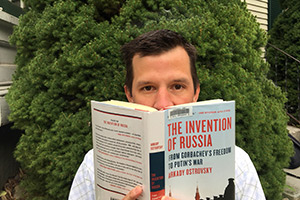
Russia/USSR has long been a place that fascinates me. As a kid growing up in the 1980’s, some of my earliest memories were of Mikhail Gorbachev’s visits to the US. As a product of a liberal arts college, I took classes in Russian language, history, and literature (in addition to my chemistry classes). The Russia of my childhood/college years was very volatile and oftentimes confusing. Journalist Arkady Ostrovsky’s book The Invention of Russia tackles this time period in Soviet/Russian history. The main thrust of his book is that Russia was (and perhaps still is) volatile and confusing because post-Soviet Russian leaders were (and are) quite literally inventing Russia. With the end of a Communist Party monopoly on politics, what would the Russian people’s relationship with their government look like? With the end of the Soviet Union empire, what would Russia’s place in the world be? Ostrovsky highlights the role of the media (and media oligarchs) in the invention process, and how they steered the invention process from the idealistic days of the early 1990’s (would it be possible Russia become a liberal democracy?) to the present state of affairs. The book helped me put together the pieces of Russia in those hectic days of the mid-90’s. Why did Yeltsin order the shelling of the Russian Duma? What were the Chechen Wars all about? How did a low level KGB agent become president of Russia and why is he still as popular as ever? If you’re interested in Russia and want to try to “figure out” this enigmatic country, The Invention of Russia is a good step in that direction.

